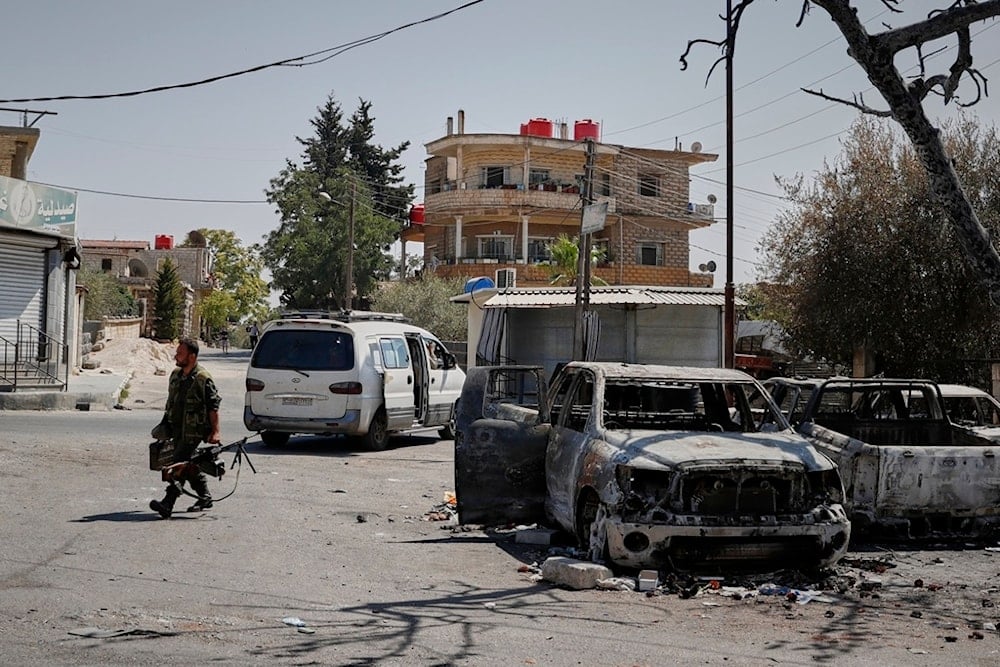Hasakah meeting urges decentralized Syria, backs SDF, justice reforms
Representatives from North and East Syria met in Hasakah to push for a decentralized democratic state, backing the SDF and transitional justice reforms.
-

A Druze fighter carrying a machine gun walks past a burned-out car following last week's sectarian clashes in the Druze-majority town of Sweida, Syria, Friday, July 25, 2025 (AP)
A conference titled “Unity of the Position of the Components of the North and East Syria Region” was held on Friday in the city of Hasakah under the slogan “Together for diversity that strengthens our unity… with our partnership, we build our future.” Representatives of the region’s various ethnic and religious components took part in the gathering.
Final statement affirms national partnership
In its final statement, the conference said it convened at a “sensitive national stage” and out of “shared responsibility for the country’s present and future.” It brought together representatives of the region’s components, be it Kurds, Arabs, Syriac Assyrians, Turkmen, Armenians, Circassians, or others, to reaffirm their joint commitment to a national democratic path based on diversity, partnership, and equal citizenship.
Participants highlighted the marginalization and exclusion these communities have faced under successive central governments.
The statement said that what is taking place in various parts of the country, particularly on the coast, Sweida, and Christian areas, amounts to crimes against humanity. These, it stressed, require impartial and transparent investigations to identify those responsible, “whoever they may be,” as they undermine the entire Syrian national fabric.
Self-administration and a national army
The conference affirmed that the Autonomous Administration model “represents a developable experience that reflects democratic community governance,” calling for its consolidation within a political and administrative framework that guarantees genuine representation for all components.
Participants expressed appreciation for the US-backed Syrian Democratic Forces (SDF), describing them as the nucleus of a new Syrian national army, “professional and voluntary”, that reflects the reality of Syrian society and protects the country’s borders and territorial integrity.
Towards a decentralized state and democratic constitution
On the political vision for a solution, the statement called for drafting a democratic constitution that enshrines ethnic and religious diversity and establishes a decentralized state based on good governance, social justice, and freedom of belief.
It also urged a review of the current constitutional declaration, describing it as falling short of Syrians’ aspirations, and emphasized the need to launch a transitional justice process to achieve national reconciliation, ensuring truth-seeking, redress for victims, and creating conditions for the return of displaced persons while rejecting demographic change.
The statement further stressed the importance of revising administrative divisions to reflect geographical and cultural specificities, and of strengthening the role of women, youth, and civil society in state-building while rejecting hate speech.
Supportive stances and political proposals
The statement referred to the Abdi-Sharaa agreement and the outcomes of the “Unity of the Kurdish Position” conference, affirming commitment to them as steps toward a comprehensive national consensus. It called for convening an inclusive Syrian national conference with the participation of all national and democratic forces to build a common national project.
It concluded that the document emerging from the conference reflects a free and conscious collective will to build a free, united, democratic, pluralistic, and decentralized Syria governed by the rule of law and safeguarding human dignity.
Hamo: No place for authoritarianism
In the same context, Siban Hamo, a member of the General Command of the Syrian Democratic Forces, stressed that “work is ongoing for a decentralized Syria, and we will not abandon our goal of building a democratic, pluralistic state.”
“If someone comes to us and says: join us and things will return to how they were before, we will never accept,” he said, describing the Ahmad al-Sharaa government as “an extension of authoritarianism” where “names have changed but the mentality remains the same.”
Hamo added that “the government rules the country through foreign gunmen and does not represent the will of Syrians,” warning that continued intransigence and authoritarianism would prevent the SDF from joining the Syrian army. He pointed to alternative options for the forces, saying: “We are not incapable.”

 4 Min Read
4 Min Read










